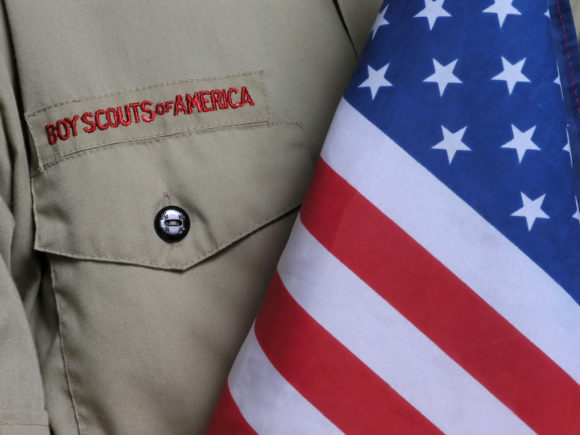DOVER, Del. (AP) — The official committee representing child sex abuse victims in the Boy Scouts of America bankruptcy is asking a judge for permission to file its own reorganization plan, saying the plan proposed by the BSA falls woefully short of fairly compensating abuse victims while shielding local Boy Scouts councils and sponsoring organizations from liability.
The official tort claimants committee filed a motion late last week objecting to the BSA’s request for the court to extend the period in which the Boy Scouts have exclusive rights to file and solicit votes on a reorganization plan.
The BSA’s plan proposes a $300 million contribution by local councils to a fund for victims, about $115 million in cash and noninsurance assets from the BSA, and the assignment of BSA and local council insurance policies. In return, the 253 local councils and thousands of sponsoring organizations would be released from further liability.
The committee noted in its court filing that it had made a settlement offer to the Boy Scouts estimating the value of the roughly 84,000 sexual abuse claims filed in the bankruptcy at about $103 billion, adding that those estimates were “extremely conservative.”
The committee noted that its estimate counts each claim as a single act of abuse, even though a substantial number of victims were abused repeatedly and in different ways over several years. The committee also noted that its average claim value of $811,215 is less than the average of $1.2 million per claim that the University of Southern California agreed to pay last month in an $852 million settlement with more than 700 women who accused the college’s longtime campus gynecologist of sexual abuse.
The committee’s objection to the BSA’s exclusivity motion coincided with the final day of a three-day mediation session in which attorneys for the Boy Scouts sought to gain support for their plan from creditors, insurers and other parties.
The mediation session followed Judge Laurie Selber Silverstein’s rejection of the BSA’s request for an April 15 hearing to approve the disclosure statement outlining its reorganization plan. Silverstein, who instead will hold a status conference next Monday, expressed frustration about the lack of progress in the case and said BSA attorneys had not provided “some very necessary information and documents” for a disclosure hearing.
Attorneys for the victims committee also have expressed frustration about the lack of details in BSA’s plan, which has been roundly criticized by attorneys representing abuse victims.
Committee attorneys said they should be permitted to file a plan that allows the debtors to reorganize “without the fire-sale intra-family settlement with the local councils and chartered organizations.”
Committee attorneys indicated that the biggest difference between their plan and the BSA plan is that theirs will not include nonconsensual third-party releases from liability for the local councils and sponsoring organizations. Instead, their plan would allow for releases to be negotiated by the committee or the settlement trust, “but not for the relatively paltry sum offered by the local councils.” They also said that if the Boy Scouts and local councils want to rely on insurance carriers to provide the bulk of compensation for abuse victims, the local councils and sponsoring organizations do not need releases from liability.
Committee attorneys also maintain that their plan will allow the BSA to reorganize as an ongoing, “financially feasible” entity.
BSA attorneys have argued, however, that allowing creditors to file a competing plan would make it difficult, if not impossible, to negotiate and implement a global resolution of abuse claims and would “unleash boundless litigation.”
The Boy Scouts of America, based in Irving, Texas, sought bankruptcy protection last February in an effort to halt hundreds of lawsuits and create a compensation fund for men who were molested as youngsters decades ago by scoutmasters or other leaders.
Attorneys for abuse victims made clear from the onset that they would go after campsites and other properties and assets owned by local councils to contribute to a settlement fund. The local councils, which run day-to-day operations for local troops, are not debtors in the bankruptcy and are considered by the Boy Scouts to be legally separate entities, even though they share insurance policies and are considered “related parties” in the bankruptcy case.
The bankruptcy case has been bogged down by disputes over the provision of information by local Boy Scouts councils about their financial assets, claims by the BSA that hundreds of millions of dollars worth of its own assets are restricted and unavailable to abuse victims, and concerns by BSA insurers that attorneys for abuse victims have submitted tens of thousands of claims without ensuring their validity.
Was this article valuable?
Here are more articles you may enjoy.


 Moody’s: LA Wildfires, US Catastrophes Drove Bulk of Global Insured Losses in 2025
Moody’s: LA Wildfires, US Catastrophes Drove Bulk of Global Insured Losses in 2025  AI Claim Assistant Now Taking Auto Damage Claims Calls at Travelers
AI Claim Assistant Now Taking Auto Damage Claims Calls at Travelers  Tesla’s Austin Robotaxis Report 14 Crashes in First Eight Months
Tesla’s Austin Robotaxis Report 14 Crashes in First Eight Months  Asbestos Lawsuits Prompt Vanderbilt Minerals to File Bankruptcy
Asbestos Lawsuits Prompt Vanderbilt Minerals to File Bankruptcy 